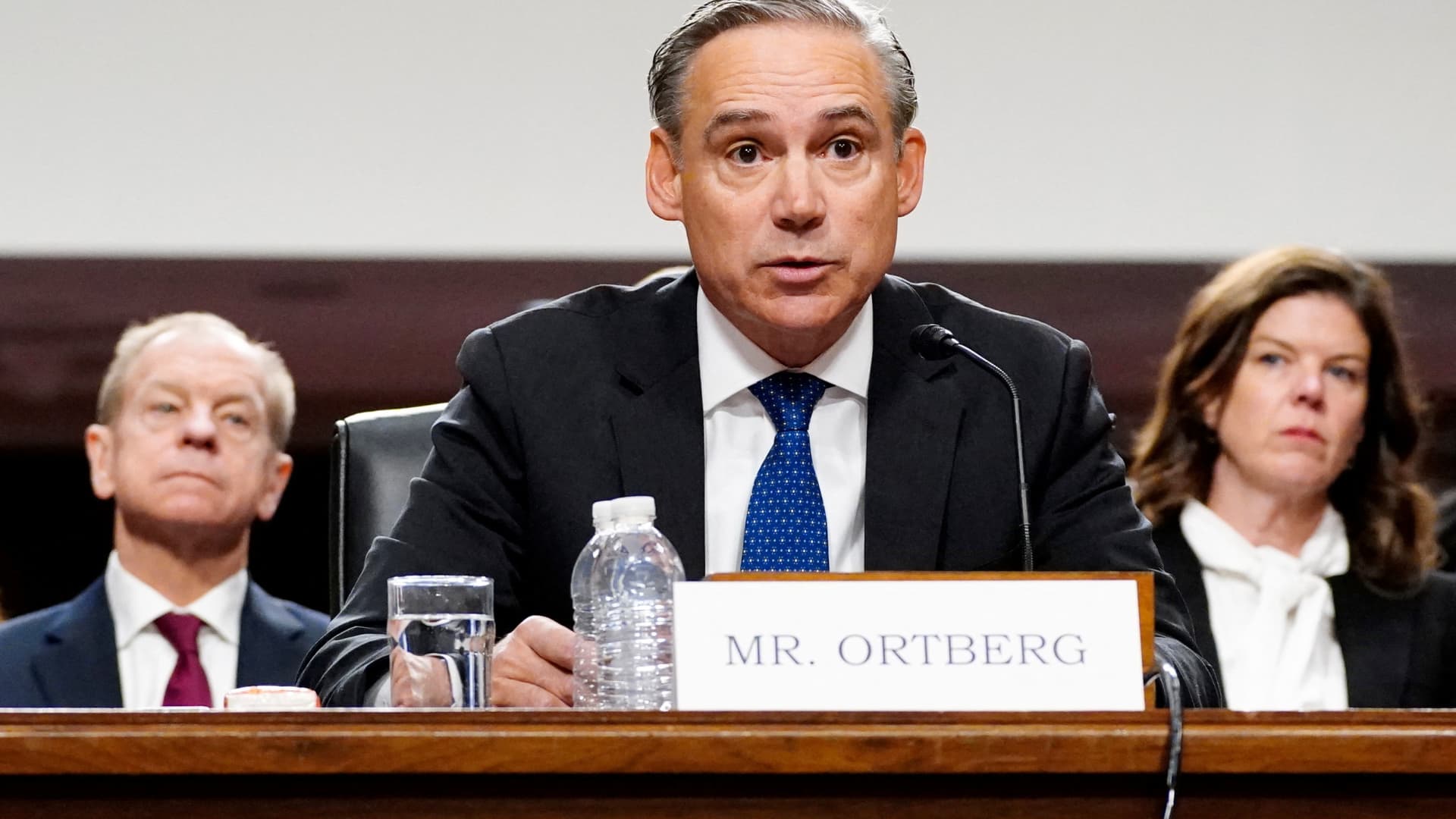Global Trends and Politics
Vaccine Stocks Fall After FDA’s Peter Marks Resigns Over RFK Jr.

Biotech Stocks Plunge as Top Vaccine Regulator Quits
Shares of major vaccine makers dropped on Monday after a key U.S. health official resigned in protest of Health and Human Services Secretary Robert F. Kennedy Jr.’s views on immunization.
Resignation of Peter Marks
The departure of Peter Marks, the Food and Drug Administration’s top vaccine regulator, has raised fresh fears about whether the Trump administration will quickly approve and promote critical shots. In his position, Marks oversaw the introduction of Covid-19 vaccines and rules for the use of emerging treatments like cell and gene therapies.
Stock Market Reaction
Shares of Moderna and Novavax dropped more than 11% and 6%, respectively, in early trading. The SPDR S&P Biotech ETF slid nearly 5%. Shares of Pfizer, which has broader businesses to insulate it from damage to its vaccine portfolio, lost about 2%.
Analysts’ Concerns
Some Wall Street analysts said Marks’ departure could undermine the FDA’s mission of ensuring safe and effective treatments reach patients in the U.S. That could put even more pressure on a struggling biotech sector.
BMO Capital Markets’ View
"Taking a step back, we view this departure as a significant negative for the BioPharma and Biotech sectors, as FDA’s independence rooted in sound scientific rigor is critical for their efficient functioning," analysts at BMO Capital Markets wrote in a note Monday.
Resignation Letter
In his resignation letter, Marks criticized Kennedy’s "misinformation and lies" about immunization. He said a growing measles outbreak that started in Texas came as a consequence of "undermining confidence in well-established vaccines."
Department of Health and Human Services’ Response
The Department of Health and Human Services did not immediately respond to a request for comment.
Kennedy’s Views on Vaccines
Kennedy, a prominent vaccine skeptic, has already taken steps that public health experts say could deter routine immunizations in the U.S. He has downplayed the importance of the measles, mumps and rubella vaccine and promoted unproven treatments to counter the measles outbreak.
Analysts’ Take
Analysts at Leerink Partners wrote in a Monday note that the effect of Marks’ resignation on biotech and pharmaceutical stocks will depend in part on who replaces him at the FDA and whether Republicans in the White House and Congress start to lose patience with his approach. Other analysts also stressed that Marks is only one official at the agency and noted that new FDA Commissioner Marty Makary has a track record of supporting proven treatments.
Conclusion
The resignation of Peter Marks, the top vaccine regulator at the FDA, has sent shockwaves through the biotech and pharmaceutical industries. The impact of this departure on the sector will depend on who replaces Marks at the FDA and whether the administration’s approach to vaccines shifts in the coming months.
Frequently Asked Questions
Q: What is the impact of Peter Marks’ resignation on the biotech and pharmaceutical industries?
A: The resignation has sent shockwaves through the industries, with shares of major vaccine makers dropping in early trading.
Q: Why did Peter Marks resign?
A: Marks resigned in protest of Health and Human Services Secretary Robert F. Kennedy Jr.’s views on immunization.
Q: What are the concerns about the FDA’s mission under the new administration?
A: Some analysts are concerned that the FDA’s mission of ensuring safe and effective treatments reach patients in the U.S. could be undermined, potentially putting even more pressure on a struggling biotech sector.
Global Trends and Politics
generate single title from this title Trump tariffs news: Advertisers look for flexibility . And it must return only title i dont want any extra information or introductory text with title e.g: ” Here is a single title:”

Write an article about
Brands and advertisers are seeking flexible terms as they face uncertainty about how President Donald Trump’s new tariffs will affect their businesses.
The push for more lenient agreements, in which companies could pivot budgets quickly or shift their focus to different types of marketing as they react to the duties, has been the focus of conversations between media companies and advertisers in recent weeks, according to people close to the discussions.
President Donald Trump announced he would put minimum 10% tariffs on all imports into the U.S., with far steeper duties on dozens of countries including China and Vietnam. The scarcity of specifics in recent weeks, and sometimes contrasting messages coming from the White House, have fueled conversations about flexibility between chief marketing officers and media executives, the people said.
“In this period of uncertainty, we’re seeing a significant shift toward more flexible, performance-based advertising models that allow brands to adjust spending quickly if conditions change,” said Jonathan Gudai, CEO of Adomni, an artificial intelligence-powered programmatic video-everywhere advertising platform. Buying ads programmatically, or through digital platforms, has taken up an increasingly large part of ad spending, and using AI tools are now often part of the process.
Unsteadiness in the economy often mean companies pull back on spending for advertising and marketing. The potential hit to the ad market underscores the ripple effect of tariffs on companies that won’t directly contend with heightened costs on products.
Tariffs aren’t the only factor causing advertisers to rethink their budgets, said Kate Scott-Dawkins, global president of business intelligence of GroupM, WPP’s media investment group.
“We were pretty bullish in our December forecast on [ad spending] growth for the U.S. I think we’ll probably end up curbing that in the June forecast, based on the confluence of impacts,” said Scott-Dawkins. “From the rising inflation plus layoffs and unemployment plus the impact of tariffs. I think it’ll be all those things together that lead to a reduction in our expectations for the year.”
GroupM forecast spending in the U.S. ad market to grow 7% in 2025, after totaling $379 billion in ad revenue in 2024, excluding political advertising, according to a recent report.
For media companies, the uncertainty also comes soon after they contended with tightened ad budgets during the height of the pandemic.
In some regards, advertising has stabilized for many media companies since the pandemic — especially for streaming platforms and those with live sports rights. But traditional TV networks still face lower advertising revenue as consumers shift away from the standard bundle of cable channels, and digital platforms and streaming gobble up a larger share of ad budgets.
Some advertising categories such as autos haven’t rebounded, however, and companies are unsure what tariffs will mean for spending, the people said. Conversations with chief marketing officers at automakers have been frequent, they added. Trump has announced 25% tariffs on cars and some auto parts not made in the U.S.
The tariffs also come weeks before Upfront presentations, when media companies make their annual pitch to advertisers.
“Everything I hear about Upfronts and the state of overall trading in the ad world is that it’s cautious,” said Jonathan Miller, CEO of Integrated Media, which specializes in digital media investments. “There’s much more demands for flexibility, and while it’s not recessionary, there’s a slight holding back…meaning a couple of percentage points of overall growth. Enough that is felt.”
Gudai of Adomni added that traditional TV will be one of the areas most vulnerable to ad budget cuts, but brands will also have to broaden their focus when it comes to competing for customers who could face higher prices on goods.
“Tariffs potentially create a dual impact — increased costs that may squeeze advertising budgets, but also greater need for targeted advertising as brands compete on factors beyond price,” Gudai said.
While media executives are open to offering flexibility, they’ve also been reminding brands that advertising during tough economic times can build brand awareness and help businesses long term, the people said.
Some brands are better served not cutting back on ad spending, too, especially if they don’t have brick-and-mortar stores or ways outside of marketing to get in front of potential customers. Scott-Dawkins said for some companies it’s still worth spending on TV ad spots since it’s still considered the most effective way to reach consumers.
“When every dollar is under scrutiny, brands have to do more than just sell—they have to connect. Purpose-driven marketing isn’t a ‘nice to have’ anymore; it’s how brands earn trust and build lasting relationships,” said Andre Banks, founder and CEO of NewWorld, a marketing and strategy consultancy. “In uncertain times, consumers gravitate toward companies that stand for something real. Advertisers who recognize this will be the ones who don’t just survive the downturn but come out stronger on the other side.”
remove and CTA’s or button or links from it .Organize the content with appropriate headings and subheadings (h1, h2, h3, h4, h5, h6). Include conclusion section and FAQs section at the end with questions and answers. do not include the title at start of article. it must return only article i dont want any extra information or introductory text with article e.g: ” Here is rewritten article:” or “Here is the rewritten content:”
Global Trends and Politics
Boeing CEO Pressed by Senate to Detail Plane Maker’s Recovery

Boeing CEO Outlines Plan to Address Safety Concerns
Boeing CEO Kelly Ortberg testified before the Senate Commerce, Science, and Transportation Committee on Wednesday, outlining the company’s progress on improving its manufacturing and safety standards. The hearing comes after a January 2024 mid-air emergency involving a new 737 MAX, which left Boeing’s factory without key bolts installed.
Ortberg faced questions from lawmakers about how the company will ensure that it doesn’t repeat past accidents or manufacturing defects. Senator Ted Cruz, the committee’s chairman, invited Boeing managers and factory workers to report to him their opinions on the company’s turnaround plan.
Boeing’s Commitment to Safety
Ortberg acknowledged that Boeing still has more to do, but emphasized the company’s commitment to safety. "Boeing has made serious missteps in recent years — and it is unacceptable. In response, we have made sweeping changes to the people, processes, and overall structure of our company," he said. "While there is still work ahead of us, these profound changes are underpinned by the deep commitment from all of us to the safety of our products and services."
Improvements Across Manufacturing Lines
Ortberg and other Boeing executives have outlined improvements across the manufacturer’s production lines in recent months, including a contract worth more than $20 billion to build the United States’ next generation fighter jet. However, lawmakers and regulators have maintained heightened scrutiny on the company, a top U.S. exporter.
Federal Aviation Administration Oversight
The Federal Aviation Administration (FAA) capped Boeing’s production of its 737 Max planes at 38 a month following the January 2024 door plug blowout. The agency plans to keep that limit in place, though Boeing is producing below that level. Acting FAA Administrator Chris Rocheleau said at a Senate hearing last week that the agency’s oversight of the company "extends to ongoing monitoring of Boeing’s manufacturing practices, maintenance procedures, and software updates."
Conclusion
Boeing’s commitment to addressing safety concerns is a critical step in rebuilding trust with lawmakers, regulators, and the public. While the company still faces challenges, its progress on improving manufacturing and safety standards is an important step forward.
Frequently Asked Questions
Q: What is Boeing’s plan to address safety concerns?
A: Boeing CEO Kelly Ortberg outlined the company’s plan to improve manufacturing and safety standards, including sweeping changes to the company’s people, processes, and overall structure.
Q: What is the Federal Aviation Administration’s role in overseeing Boeing?
A: The FAA is responsible for monitoring Boeing’s manufacturing practices, maintenance procedures, and software updates, and has capped the company’s production of its 737 Max planes at 38 a month.
Q: What is Boeing’s production rate of 737 Max planes expected to be in 2025?
A: Boeing CEO Kelly Ortberg said the company could produce up to 38 737 Max planes a month this year, but would not push the production line if it’s not stable.
Global Trends and Politics
Impact on Manager-Employee Relationships

Political turmoil can have a significant impact on businesses and their employees. As the saying goes, “politics is local,” but the consequences of political conflicts can be felt globally. In this article, we’ll explore the effects of political turmoil on manager-employee relationships and provide insights on how to navigate these challenging times.
The Impact of Political Turmoil on Manager-Employee Relationships
Political turmoil can create a sense of uncertainty and anxiety in the workplace, which can negatively impact manager-employee relationships. When employees feel uncertain about their job security, they may become more anxious and less productive, leading to a decline in morale and overall performance.
The Effects of Political Turmoil on Manager-Employee Relationships
When political turmoil occurs, managers must navigate the challenges of maintaining a positive and productive work environment. This can be particularly difficult for managers who are trying to balance the needs of their employees with the demands of the organization. Some of the effects of political turmoil on manager-employee relationships include:
- Increased stress and anxiety: Political turmoil can create a sense of uncertainty and anxiety in the workplace, which can negatively impact manager-employee relationships.
- Decreased morale: When employees feel uncertain about their job security, they may become more anxious and less productive, leading to a decline in morale and overall performance.
- Communication breakdowns: Political turmoil can lead to a breakdown in communication between managers and employees, as employees may become less likely to share their concerns or ideas with their managers.
- Increased turnover: Political turmoil can lead to increased turnover, as employees may feel the need to leave the organization to find more stability and security elsewhere.
- Decreased motivation: Political turmoil can lead to decreased motivation, as employees may feel less motivated to perform their duties or contribute to the organization’s success.
Strategies for Navigating Political Turmoil
While political turmoil can be challenging for managers and employees, there are strategies that can help navigate these difficult times. Some of these strategies include:
Communicate Effectively
Effective communication is key to maintaining a positive and productive work environment during times of political turmoil. Managers should make a conscious effort to communicate clearly and transparently with their employees, providing regular updates on the organization’s plans and strategies.
Focus on Employee Well-being
Managers should also make a conscious effort to focus on employee well-being, providing resources and support to help employees cope with the stress and anxiety of political turmoil. This can include providing employee assistance programs, offering flexible work arrangements, and promoting work-life balance.
Build Trust and Empathy
Building trust and empathy with employees is also critical during times of political turmoil. Managers should make a conscious effort to listen to their employees’ concerns, empathize with their fears, and provide reassurance and support.
Conclusion
Political turmoil can have a significant impact on manager-employee relationships, leading to increased stress and anxiety, decreased morale, and increased turnover. However, by communicating effectively, focusing on employee well-being, and building trust and empathy, managers can help navigate these challenging times and maintain a positive and productive work environment.
FAQs
Q: How can managers effectively communicate with employees during times of political turmoil?
A: Managers can effectively communicate with employees during times of political turmoil by providing regular updates on the organization’s plans and strategies, being transparent about the impact of political turmoil on the organization, and providing resources and support to help employees cope with the stress and anxiety of political turmoil.
Q: What are some strategies for building trust and empathy with employees during times of political turmoil?
A: Some strategies for building trust and empathy with employees during times of political turmoil include listening to their concerns, empathizing with their fears, providing reassurance and support, and being approachable and available to answer questions and concerns.
Q: What are some ways to promote work-life balance during times of political turmoil?
A: Some ways to promote work-life balance during times of political turmoil include offering flexible work arrangements, providing employee assistance programs, and promoting self-care and stress-reduction techniques.
-

 Career Advice4 months ago
Career Advice4 months agoInterview with Dr. Kristy K. Taylor, WORxK Global News Magazine Founder
-

 Diversity and Inclusion (DEIA)4 months ago
Diversity and Inclusion (DEIA)4 months agoSarah Herrlinger Talks AirPods Pro Hearing Aid
-

 Career Advice4 months ago
Career Advice4 months agoNetWork Your Way to Success: Top Tips for Maximizing Your Professional Network
-

 Changemaker Interviews3 months ago
Changemaker Interviews3 months agoUnlocking Human Potential: Kim Groshek’s Journey to Transforming Leadership and Stress Resilience
-

 Diversity and Inclusion (DEIA)4 months ago
Diversity and Inclusion (DEIA)4 months agoThe Power of Belonging: Why Feeling Accepted Matters in the Workplace
-

 Global Trends and Politics4 months ago
Global Trends and Politics4 months agoHealth-care stocks fall after Warren PBM bill, Brian Thompson shooting
-

 Global Trends and Politics4 months ago
Global Trends and Politics4 months agoUnionization Goes Mainstream: How the Changing Workforce is Driving Demand for Collective Bargaining
-

 Training and Development4 months ago
Training and Development4 months agoLevel Up: How Upskilling Can Help You Stay Ahead of the Curve in a Rapidly Changing Industry









